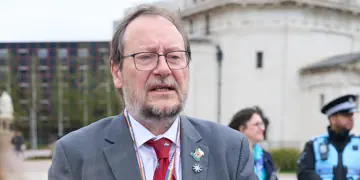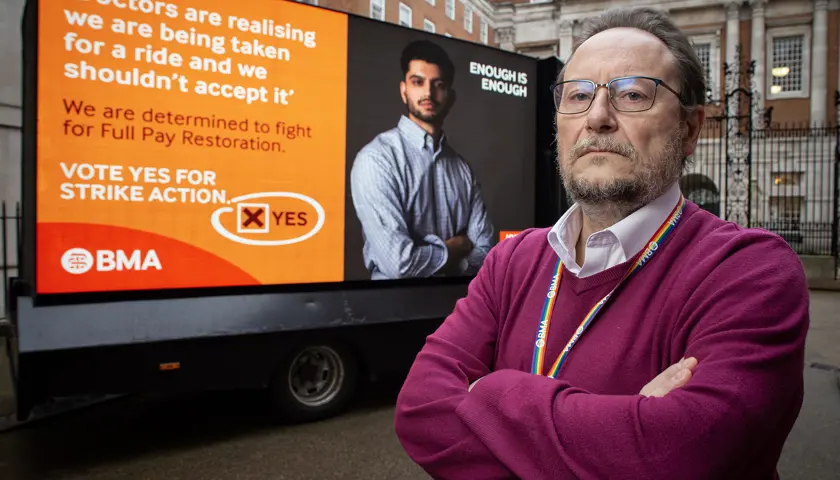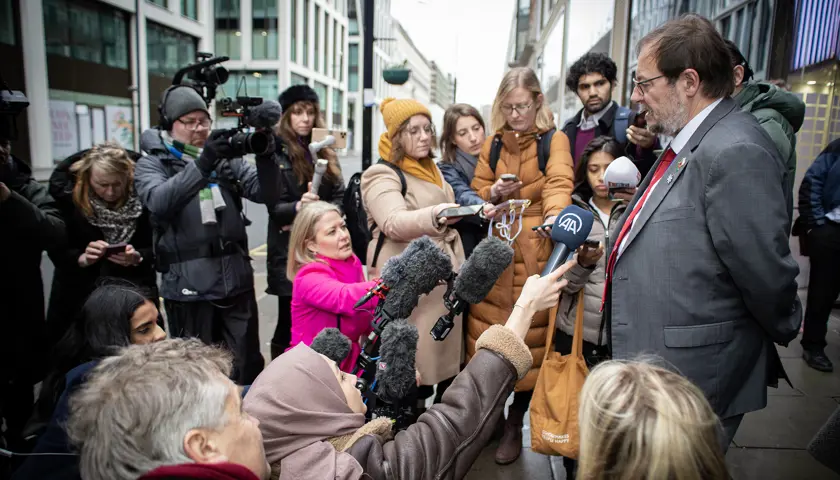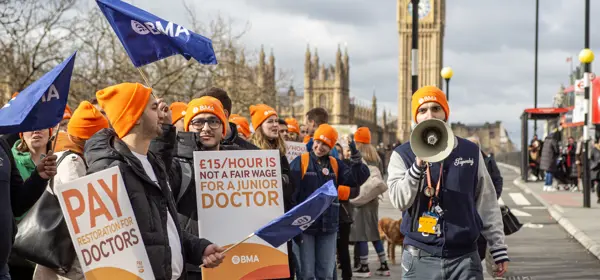The eye of the storm
The eye of the storm
Two years ago BMA council chair Phil Banfield took on his role with a rallying call to doctors: ‘Start to believe your future is in your own hands.' Industrial action, the national COVID inquiry and long-lens intrusions from national newspapers followed
‘I love it. I think I was made to be the person who stands up against things when they are wrong.’
BMA council chair Phil Banfield (pictured above) is reflecting on two years in a role in which he freely admits he wasn’t sure how he would cope or if he was the right person when elected.
‘I’m shy, I’m generally an introvert – the idea of standing outside number 10 [Downing Street] with a megaphone isn’t normal for me,’ he says.
It was a daunting task. When The Doctor sat down with Professor Banfield in the garden of his house near Rhyl in North Wales two years ago, the in tray was bulging and none of the issues on the to-do list were easy fixes.
Among the most pressing at the top of that list were preparations for serious and significant industrial action, ensuring ‘history isn’t re-written’ by being a core participant at the national COVID inquiry, growing the membership and turning around the finances of the BMA, and changing cultures and behaviour in an organisation which had been in the spotlight for the wrong reasons.
The idea of standing outside number 10 with a megaphone isn’t normal for me
Professor Banfield
The workload which comes with that sort of list is brutal. ‘One thing I heard before I was elected was that my time would no longer be my own,’ Professor Banfield, who has worked as an obstetrics and gynaecology consultant for the past 29 years, says. It wasn’t said in jest. ‘It’s like being on call for a labour ward permanently – 24 hours a day, seven days a week,’ he adds.
The week The Doctor speaks to Professor Banfield he gave up his weekend to make a 500-mile round trip from his home to London to appear on Trevor Phillips’ Sunday Sky programme, only to be bumped following the attempted assassination of US presidential candidate Donald Trump.
It has been busy and unpredictable – ‘at breakneck speed’ – for the entire two-year period with the constant churn of the news cycle and massive events from attending the Queen’s funeral to giving evidence under oath at the COVID inquiry on top of the day-to-day priorities and demands of being BMA chair.
Change of government
On that day-to-day work, Professor Banfield feels there is a ‘long way to go’ but that ‘even the most cynical critic would admit we have delivered on the BMA being more of a trade union’. It’s hard to argue – across the UK many branches of practice have taken industrial action, with consultants agreeing a new pay deal and junior doctors staging 11 walk-outs.
‘Unprecedented ballots aren’t an accident,’ Professor Banfield, who grew up in Crawley, studied medicine in London and has since worked in hospitals across the country from East Anglia to North Wales, says. ‘It is sheer knowledge, expertise, and graft from staff and members.’
For the vast majority of his time in charge, the BMA has been negotiating with a government who often wouldn’t even countenance conversations, let alone action. ‘They didn’t really seem to care,’ Professor Banfield says. But, following the general election the new Labour Government has signalled some intent to be more collegiate and relationships have improved – including semi-regular conversations between Professor Banfield and health secretary Wes Streeting.
Professor Banfield isn’t getting carried away though – until change is delivered it is largely empty niceties. ‘If we now have a government that smiles at us and talks to us but still says no, there’s no money, I still don’t have the outcome I need. This Government will be judged by what it delivers for us.’
Professor Banfield feels Mr Streeting’s declaration that the ‘NHS is broken’ means he has adopted the narrative the BMA has been urging governments to accept for some years and that the desperate requirement to bring down the NHS waiting list and unlock the economic activity that could provide means doctors are in a strong position to win the pay and conditions they deserve.
Away from industrial action and negotiations there has been huge work in many other areas, not least in challenging the increasing use of MAPs (medical associate professions) and the ‘blurred lines’ of their scope of practice and regulation.
It has meant picking fights with the GMC and the royal medical colleges, but Professor Banfield feels vindicated in doing so, particularly after meeting the parents of Emily Chesterton who tragically died aged 30 after two appointments with, and misdiagnosis by, a physician associate she believed was a GP.
‘When push comes to shove you need doctors to ensure patient safety,’ Professor Banfield says. ‘It’s hugely disappointing to clash over this but when they asked me why this is an issue for us I said: “I’m listening to 196,000 grassroots doctors. It would help if you listened too.”’
Excessive workload
There has also been a relentless focus on, and support for, general practice. For Professor Banfield, who wanted to be a doctor from the age of eight and is now married to a GP, it isn’t empty words to describe general practice as the bedrock of the NHS.
‘It’s not lip service,’ he says. ‘My generation of doctors has no idea what general practice is actually like now. It bears no resemblance to when I qualified. It is insane the number of decisions they have to make and the amount of risk they manage.’
It is insane the number of decisions GPs have to make and the amount of risk they manage
Professor Banfield
Professor Banfield cites GPs as having to bear the brunt of an increasingly unhealthy and unequal society and astronomical waiting lists. He also raises the unfairness of GP practices being forced to close over relatively small debts or clawbacks while secondary care is bailed out. Addressing the sustainability of general practice will continue to be, he says, one of the main priorities of the association.
There have been downsides to the role. A ‘threatening’ approach from a national newspaper taking long-lens photos of his house while he was away from home was ‘horrible’. But, overall, the media attention has been less brutal than feared and Professor Banfield has found himself shrugging off the angry headlines from right-wing magazines and newspapers, content that they are a barometer showing he is doing his job properly.
Finish the job
Overall, it’s been an ‘amazing’ experience and the moments where colleagues he has never met in his hospital corridors or elsewhere say a quiet ‘thank you’ are ‘reward enough’, he says.
Professor Banfield is now in his final year as council chair but says he will seek a further year at the next BMA annual representative meeting to finish the job and mirror the four-year term the current council is serving.
It is clear Professor Banfield has no intention of decreasing the pace of work. Alongside the significant continuing battles around pay, MAPs, sustainability of general practice and a host of other things, he is looking to make a major difference in areas he has not yet been able to address.
The items on top of that list, he tells The Doctor, are ensuring whistleblowers have better support from the BMA, working toward a patient-safety focused ‘no blame’ culture in workplaces, and addressing bias and discrimination in the health service and how doctors are treated by the GMC. He also wants to take action to avert the ‘dumbing down’ of medical training.
When push comes to shove you need doctors to ensure patient safety
Professor Banfield
‘I want to make sure we deliver a BMA that people feel is different,’ he says. ‘We’ve done a lot in the first two years and that makes me confident we can do the rest in the next two years.’
Professor Banfield adds: ‘If we are going to take on our problems why just take on one? We might as well try to address all of them.’
(main image picture credit: Sarah Turton)
- Until September 2024, resident doctors were referred to as ‘junior doctors’ by the BMA. Articles written prior to this date reflect the terminology then in use





